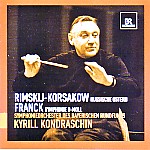These performances don’t show Kondrashin at his absolute best, but even so there’s a lot to enjoy. God knows, the Franck is light-years better than dozens of other performances I could name. The first-movement introduction is rushed–and more damagingly, somewhat clipped in its phrasing–but once the music gets going the excitement never lets up. The central Allegretto is miraculous: exactly the cross between slow movement and scherzo that Franck intended, and if you love this work then this performance is worth hearing for that movement alone. The finale blazes without a trace of the usual heaviness or pomposity.
The overture gets off to a slowish start but builds steadily to a huge final climax. The problem there is that the engineers fail to capture the percussion: no glockenspiel to give glitter to the treble, nor tam-tam to underpin the bass. There’s little question that under more controlled conditions Kondrashin might have turned in performances of both works for the ages. As it is, we can enjoy what we have, in good but slightly shallow German radio-quality sound, and lament the loss of what might have been.
































